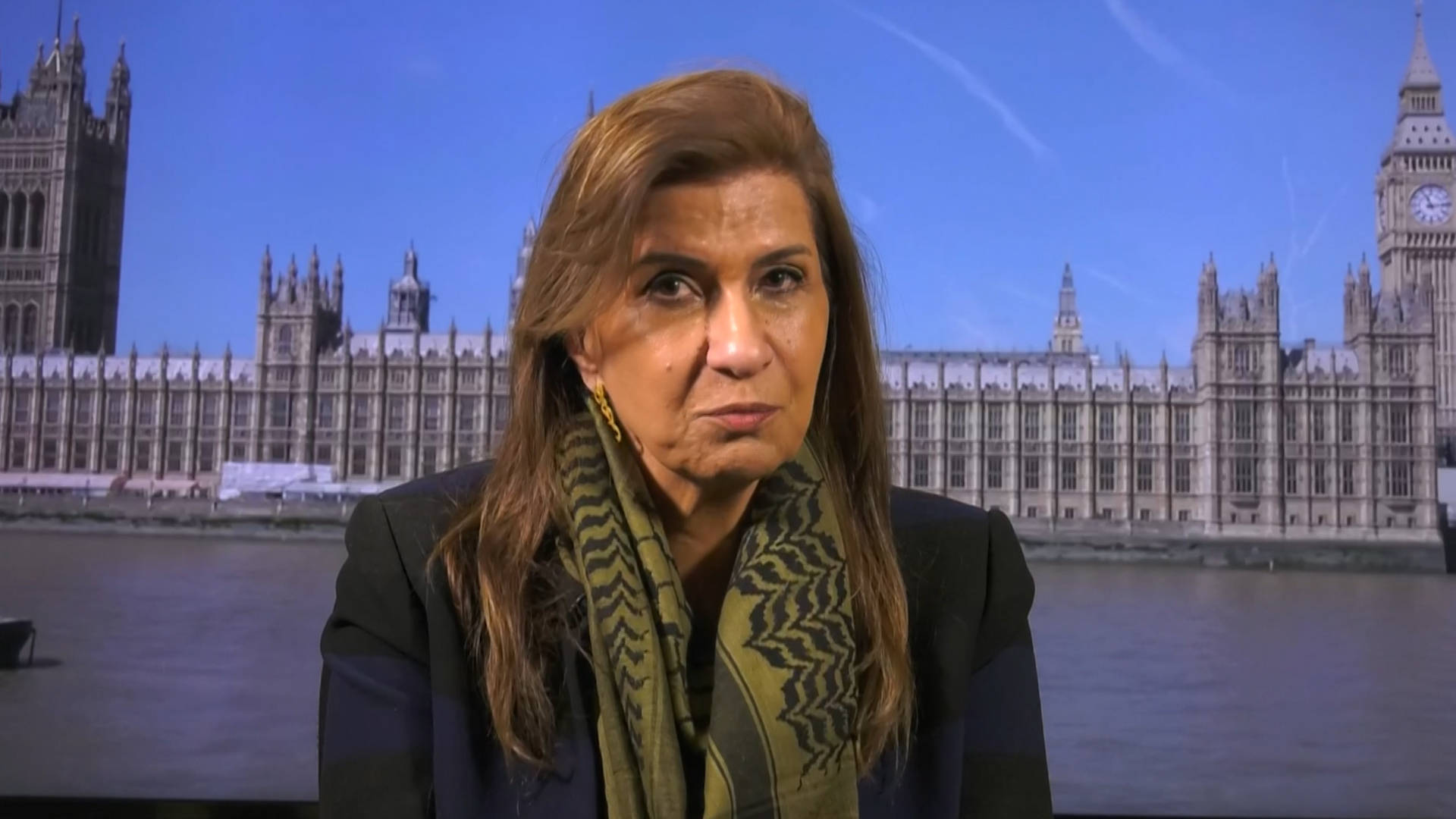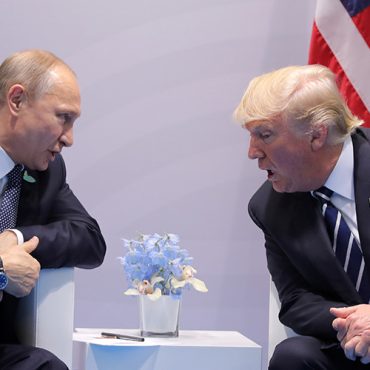This is a rush transcript. Copy may not be in its final form.
AMY GOODMAN: This is Democracy Now!, democracynow.org, The War and Peace Report. I’m Amy Goodman.
Over a hundred leading European academics have signed a petition condemning what they call “Israel’s [systematic] annihilation,” unquote, of the educational system in the Gaza Strip. The petition, which was led by the group Euro-Med Human Rights Monitor, condemns Israel’s targeting of academics, educational institutions and cultural heritage sites in Gaza. As The Intercept recently reported, within the first hundred days of its war on Gaza, the Israeli military systematically destroyed every single university in the Gaza Strip. Nearly 100 university deans and professors and three university presidents in Gaza have been killed in the Israeli assault. Meanwhile, over 4,300 students and more than 230 teachers, professors and administrators have been killed.
Meanwhile, Hebrew University in Jerusalem is coming under criticism for suspending an internationally renowned Palestinian professor for saying Israel is committing genocide in Gaza. Nadera Shalhoub-Kevorkian is a world-renowned feminist scholar whose extensive work has focused on the impacts of militarization, surveillance and violence on the lives of Palestinian women and children. She made the remarks in an interview on Israel’s Channel 12 on Monday, where she also said it was time to, quote, “abolish Zionism.”
The next day, the university issued a statement saying, quote, “As a proud Israeli, public, and Zionist institution, the Hebrew University strongly condemns Professor Shalhoub-Kevorkian’s recent shocking and outrageous statements. … To ensure a safe and conducive environment for our students on campus, the university has decided to suspend Professor Shalhoub-Kevorkian from teaching activities, effective immediately,” they wrote.
Professor Shalhoub-Kevorkian had been under pressure to resign from the university since late October, when she joined over 1,000 academics around the world in signing a petition calling for an immediate ceasefire in Gaza. Following her signature, the leadership of Hebrew University sent her a formal letter denouncing her and pressuring her to resign. Yesterday, Palestinian students on the Hebrew University campus demonstrated against professor Shalhoub-Kevorkian’s suspension on campus and chanted the Palestinian national song “Mawtini” in protest.
Well, professor Nadera Shalhoub-Kevorkian joins us now on the program, academic, feminist, author and activist, based in Jerusalem. Up until her suspension, she was chair at the Faculty of Law, Institute of Criminology and the School of Social Work and Public Welfare at Hebrew University. She’s also the chair in global law at Queen Mary University of London. She’s the author of several books, including Security Theology, Surveillance and the Politics of Fear, as well as Militarization and Violence Against Women in Conflict Zones in the Middle East: The Palestinian Case Study. Today she’s joining us from London, where she just flew to.
Professor Shalhoub-Kevorkian, welcome to Democracy Now! Explain your decision to leave and what exactly happened.
NADERA SHALHOUB–KEVORKIAN: Yes. Hi, Amy. Thank you for having me at Democracy Now!
Actually, I’m not the chair of the Faculty of Law. I’m a member of the faculty, and I’m a researcher that studies state crime and genocide and victims of abuse of power. The decision was made by the university to suspend me after a podcast that happened that asked me about my field of expertise. Let me remind you, I’m a scholar that studies state crime. I’m a scholar that studies genocide. I’m a scholar that really looks at the mundane, at the effect of what goes on, and that studies antiracism from a feminist perspective.
So, what happened is that I — actually, the letter was publicized before I read it, and nobody have contacted me. And this is not the first time that the Hebrew University, you know, publicized. They did it in October, when I said that what is happening in Gaza is a genocide. Of course, two months afterward, the ICJ is looking at it, and they even issued provisional measures against the state of Israel.
But I also need to remind us all that the academic space is a space that’s supposed to be a space whereby we share our ideas, the multiplicity of ideas. And then the Hebrew University is sending me a letter saying — telling me that this academic institution, which is the Hebrew University, is a Zionist institution, which means if my narrative is an anti-Zionist — and my narrative is clearly anti-Zionist, and I am calling for abolishing Zionism, because I see it as very violent towards the people and as causing criminalities, and, therefore, I look at state criminality. And the fact that the university is not only sending me a letter, it’s — the dean of the School of Social Work actually called my students, and he told them, in a very forceful manner, that I’m out, that I have no place at the Hebrew University, which was my academic institution for the past 30 years. This is a place where I taught, where I did the research.
The question remains whether — what is teachable, what is what should be written, what is publishable, what is what we can speak as scholars that are studying state criminality, as opposing to what is going on, as opposing to what the state is doing — is not accepted, so they throw us out of the university. And this is the same policy that the state of Israel is doing outside. So, it’s silencing. It’s preventing people from speaking. It’s threatening. It’s punishing. And it’s also done in a very degraded and undignifying manner. Calling my students a day before the end of the first semester and telling me, “You’re suspended,” is something that is beyond any expectations. But this is — and stressing it’s a Zionist institution. “You can’t abide by these rules, you’re out.”
My only concern, Amy, today is the safety of students, the safety of my students, Jewish and Palestinian, that are standing against genocide, standing against the war, refusing to see the continous and ongoing atrocities. My really concern is the silencing of dissent all over the world, because we see it in academic institutions. The question: If we think that academic institutions should work according and by the orders from the state, I don’t know why we’re having academic institutions. Academia and research requires that we’re attentive to details, to what goes on to the life of women, men, children. And I am really concerned today. And, of course, I must clearly state that the behavior of the university is a behavior that is threatening the safety of our students, the safety of colleagues that are speaking against the genocide, and my own personal safety as a person who lives in Jerusalem and the safety of my family.
AMY GOODMAN: Professor, can you tell us what you mean by your call for abolishing Zionism?
NADERA SHALHOUB–KEVORKIAN: Yes. Well, I see that the Zionist entity started by displacing people, by causing major harms, by massacres that were documented by historians, by sociologists, by political scientists and international relations. I see Zionism that have used the law and ruled by law, and not the rule of law. I have seen the Zionists causing major harm since 1948, since the Palestinian Nakba, in relation to what goes on. And it’s not only my position, the position of many scholars that see it, see Zionism, as a very racialized and racist ideology, that is about the life and the viability of one group and the exclusion and the marginalization and death of the other group.
I think we can definitely live together without the Zionist ideology, if we can talk more in terms and in concepts of justice, of equality, of fairness, of multiplicity of ideas, and not using one ideology to claim that we are here and the rest should be excluded. And I think, Amy, you see it today clearly in Gaza, what is going on today in Gaza, when babies are dying, decomposed in incubators. And I write about unchilding. I write about the attacks on children. I write about the attacks on communities. What we see in Gaza, turning it into a collective grave, is really very telling. It’s really the culmination of a very, very, very violent ideology. So I guess it’s time to reconsider the Zionist ideology, because it started, since the early ’90s, with violence, with dispossession and with lots of massacres, and to call for a discussion that is away from that very racist and very unfair and inhumane ideology.
AMY GOODMAN: Professor Nadera Shalhoub-Kevorkian, can you talk about the concept you put forward of unchilding?
NADERA SHALHOUB–KEVORKIAN: Yes. You know, working for years with children, watching them, watching them interacting in a space that is so militarized like East Jerusalem — I live, I reside in East Jerusalem; I raised my three beautiful daughters in Jerusalem — and the effect of the system looks at Palestinian children as others, but looking at children as unchilded. And I see it today. Only two days ago, Rami, a 12-year-old from mukhayam Shuafat, was shot and killed without even a reason. He was playing. It’s Ramadan.
So, what I explain in my book on unchilding is that, number one, our children are political capital in the hands of the state. The state looks at them and clearly defines them as nonchildren. They can be killed. They can be incarcerated. You can prevent them from studying. And you see, again, the culmination of unchilding, you see it today in Gaza. But look at occupied East Jerusalem, occupied East Jerusalem, the number of children that were arrested, that were incarcerated, the number of children in the West Bank, in Hebron, and so on. So, childhood in Palestine requires a different political lens. Childhood in Palestine, as in other settler-colonial contexts — and I need to remind the viewers that this is a settler-colonial entity. There’s structure, and it’s not an event here and an event there. It’s built about the indiginization of the settler and the eviction of the native. And it’s embedded in the logic of elimination, so the elimination of our kids in various modes, whether by incarcerating them — and you see the necro-carceral machinery against them in every place — or by controlling their way of living, of moving, or controlling — and these are — again, these are topics that I have discussed, I have covered for over 30 years as a professor at the Hebrew University at both the Faculty of Law and School of Social Work.
And my question always, and especially now, when they decided — when they took this decision, is: How can a scholar of state crime, a scholar that is studying victims of abuse of power, that is talking to them, listening to the voices of the kids, listening to the voices of fathers that are trying to safeguard, parents that are also being unparented — how can a scholar like me, who’s doing and researching, sit and be silent in times of genocide? How can you silence the voices of dissent all over the world? And I think that, as an academic institution, they really need to rethink their steps.
And until now, Amy, nobody have talked to me, not the president nor director. All they do is they send letter, and the letters are sent to the media, and then I learn about it. And I must tell you that, you know, this time, sending the letter to the media, and all of a sudden everybody is talking about me, my photo, my pictures, is very scary, in an area that is heavily militarized.
And maybe I should stress one thing that is important. The Hebrew University is highly militarized. Our students — I mean, Jewish students are walking around with rifles, with guns. And Palestinian students are extremely worried and fearful. And as a Palestinian professor, I talk about those things. I study. I’m running a major study, funded by the Israeli Science Foundation, on the issue of the effect of enrolling in a university that speaks and thinks in a specific way. But I thought that they will be open to multiplicity of ideas, since I was writing about those issues for year. And this is me. This is my career. This is my analysis for year.
But let me again stress that I’m really worried today, because yesterday one of the students that participated in the demonstration was arrested. I’m very worried. They were taking pictures of the different students that were there. And mind you, there were professors. There were Jewish and Palestinian professors. There were Jewish and Palestinian students demonstrating against the decision. And framing them and shaming them and attacking them, the way they’re doing to me, and trying to punish is something that should not be done in an academic institution.
AMY GOODMAN: And how do you answer the charge from Prime Minister Netanyahu on down that to be anti-Zionist is to be antisemitic, Professor Shalhoub-Kevorkian?
NADERA SHALHOUB–KEVORKIAN: Well, anti-Zionism is totally not antisemitism. Anti-Zionism is to refuse to accept violence, and this is not antisemitism. Anti-Zionism is to refuse to accept continuous dispossession, is to refuse to accept this ideology of supremacy, is to refuse to accept the securitized ideas of one group against the other — the opposite, totally opposite, actually, to think through the lens of antisemitism — is to remember never to frame any group or anybody as ontologically below being, below human. And that’s exactly what Netanyahu, what Zionism is doing to the Palestinian. It’s actually anti-Palestinianism and antisemitism are very close. I guess that I think that we need to always remember that abuses of power is antisemitism, that framing one group as nonhuman is antisemitism, and this is what Zionism is doing to us.
AMY GOODMAN: We’re going to break, but I’m going to ask you to stay on, as well, as we go to an Israeli scholar, Maya Wind, who has written the book Towers of Ivory and Steel: How Israeli Universities Deny Palestinian Freedom. We’ve been talking with the renowned Palestinian academic, professor Nadera Shalhoub-Kevorkian, who is a feminist author and activist, usually based in Jerusalem, recently suspended by Hebrew University after teaching there for decades. She’s the author of a number of books, including Security Theology, Surveillance and the Politics of Fear and Militarization and Violence Against Women in Conflict Zones in the Middle East: The Palestinian Case Study. Stay with us.











Post comments (0)